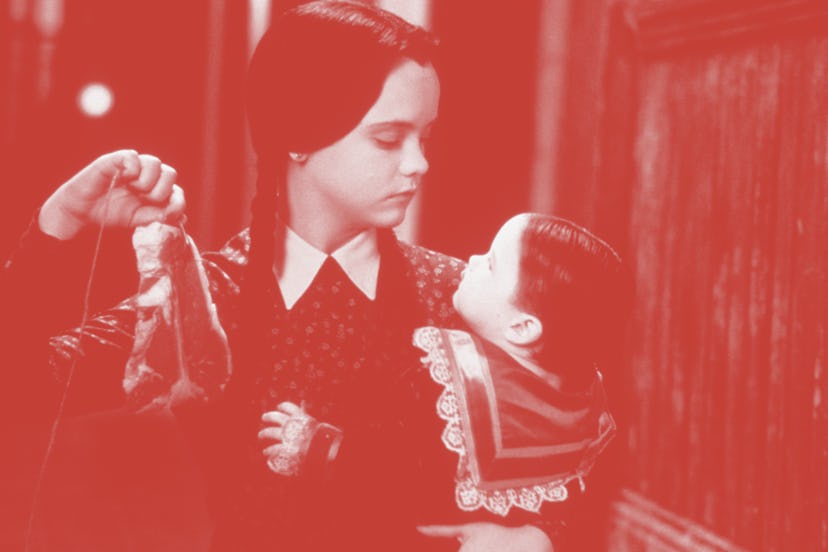You Need To Watch The Greatest Summer Camp Movie Before It Leaves Netflix
Addams Family Values is better than you remember.

The best summer camp movie isn’t what you might expect. The movie is the 1993 sequel, Addams Family Values. Its wicked social commentary, taken from the perspective of perplexed outsider kids, makes it a better summer camp movie than such apogees of the form as Wet Hot American Summer, Meatballs, and Ernest Goes to Camp. It’s not just funny. It’s an ode to revolutionaries, an incitement to rebellion. And you need to watch it before it leaves Netflix. Mild spoilers ahead.
Novelist, playwright, Movieline columnist, and all-around wit Paul Rudnick did such a good job punching up Caroline Thompson and Larry Wilson’s screenplay for the smash hit 1991 comedy The Addams Family that he got the gig writing the even better, if less commercially successful, 1993 sequel. Rudnick boldly chose to make the sequel to Barry Sonnenfeld’s adaptation of Charles Addams’ comic strip a Thanksgiving movie and a Summer camp movie despite Thanksgiving happening months after the end of summer camp season and neither Thanksgiving nor summer camp seeming like a natural fit for America’s first family of spookiness.
Addams Family Values soars as a culture clash comedy featuring ‘80s-style-slobs-versus-snobs. But what makes it the best summer camp movie of all time — in addition to being the best Thanksgiving movie and a solid contender for the best sequel ever — is that Rudnick was able to Trojan horse a scathing and insightful satire of American conformity and cultural genocide inside the exceedingly commercial form of a follow-up to a blockbuster.
In his eminently quotable, damn near perfect script for Addams Family Values, Rudnick uses Camp Chippewa as a microcosm for all that is hypocritical and oppressive in American society which, from a kid's point of view, is just about everything.
Addams Family Values doesn’t seem like it will be a summer camp movie until we meet the arch-villain Debbie Jellinsky (Joan Cusack, at her most evisceratingly dark), a black widow in low-cut pastel sweaters. She’s succeeded in tricking Gomez (Raul Julia) and Morticia (Anjelica Huston) into sending their children to Camp Chippewa to keep them from foiling her evil scheme to marry and then murder their oblivious Uncle Fester (Christopher Lloyd) for his money.
At Camp Chippewa, we’re introduced to equally unforgettable secondary villains Gary Granger (Peter MacNicol, in a performance that nearly bests his role as Dr. Janosz Poha in Ghostbusters 2) and his wife Becky Martin-Granger (the sublime Christine Baranski). They’re counselors at a $20,000-a-session camp for the absurdly privileged whose plastic smiles and unnervingly chipper facades mask a core of pure evil.
These grinning jackals run Camp Chippewa with an iron fist as a way of imposing their fascist, racist values on impressionable children and, in an even more disturbing development, as a way of forcing innocent young people to perform Gary’s god-awful brand of amateur musical theater hackwork.
Wednesday and Pugsley are less traditional campers than sentient dark clouds that descend upon Camp Chippewa with ominous intent and proceed to wreak havoc and turn its orderly world upside down. Rudnick’s screenplay is full of moments that are as hilarious as they are scathingly satirical, like when the children are practicing swimming safety and the camp’s resident blond mean girl eagerly volunteers, “I’ll be the victim,” to which Wednesday responds, with bone-dry wit and understatement, “All your life.”
Camp Chippewa, which shamelessly exploits, co-opts, and appropriates Native American customs, phrases, ideas, and traditions despite not having a single Native American counselor or any real connection to Native American history, is an open-air prison for rebels like Wednesday and Pugsley.
Joan Cusack and Christopher Lloyd in Addams Family Values.
The homicidal siblings are placed in the camp’s “Harmony Hut” for their transgressions. The Harmony Hut is like a reverse version of the conditioning program in A Clockwork Orange only instead of being exposed to unimaginable horrors in rapid succession, they’re shown Disney movies, The Sound of Music, Annie, and other normie fare beloved by boring white people.
Wednesday doesn’t like people. That’s what makes her so paradoxically lovable. But she does fall, and fall hard, for fellow camper Joel Glicker, a neurotic kid who is allergic to everything but Wednesday. Joel, seemingly the one Jewish kid at this summer camp, is just as much an outcast as Wednesday. They’re a study in opposites who fall for each other because they hate the same things, most notably their counselors and Camp Chippewa.
Addams Family Values climaxes during a production of a musical abomination Gary Granger has written about the first Thanksgiving that pits popular mean girls who all look the same as condescending, racist pilgrims. So, Wednesday, Joel, and all the other outcasts who don’t belong because of how they look or what religion they follow, or the color of their skin, fight back joyously against their oppressors in a glorious orgy of righteous underage violence.
In this wildly over-achieving sequel film, Sonnenfeld and Rudnick are not content to be merely hilarious. They’re also intent on making a statement about the American experiment and how it’s probably a mistake. None of this compromises the fun. Addams Family Values’ entertainment value as one of the most ridiculously enjoyable Hollywood comedies of the last 50 years.
Catch Addams Family Values now before it leaves Netflix on Jan. 31, 2023.
After that, maybe just get the Blu-ray? You’ll want to watch this one over and over again.
This article was originally published on